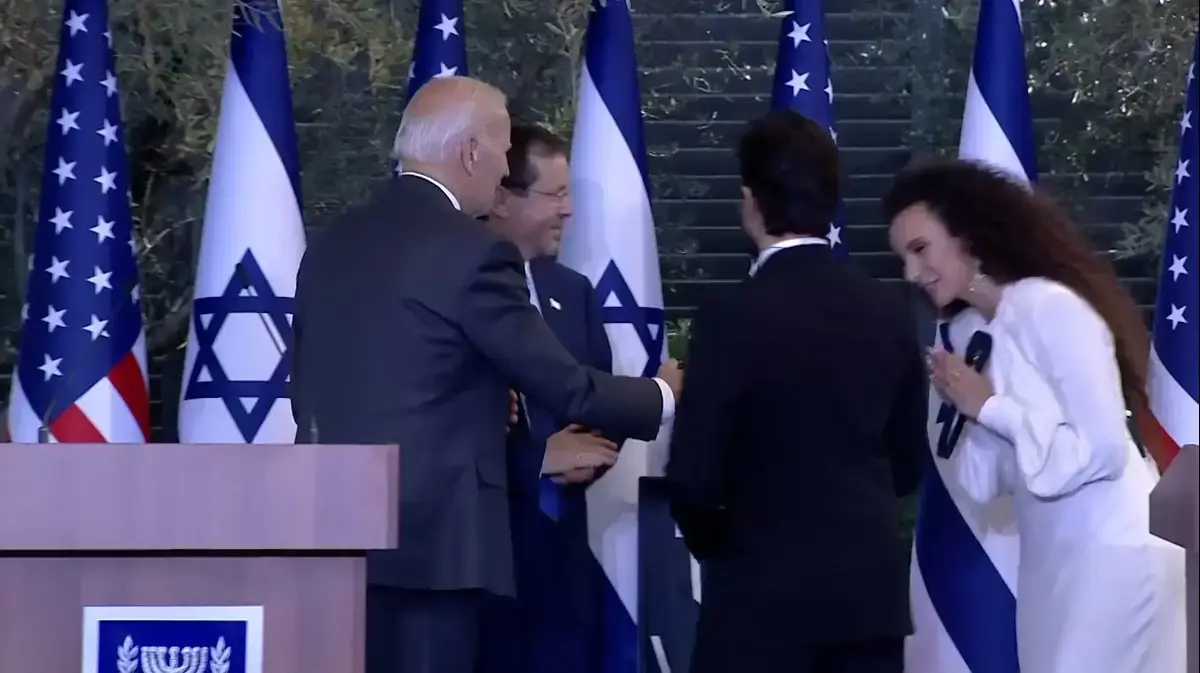Halacha position: Did Yuval Dayan act correctly when he did not shake Biden's hand?
Rabbi Shai Tahan, head of the Shaare Ezra Kollel and head of the Arazi Lebanon Teaching House, was asked about the storm caused by the singer who refused to shake the President of the United States' hand and replied at length:
His full and detailed answer is inside
David Berger, submitted on behalf of Shuva Israel
17/07/2022
Sunday, 17 July 2022, 08:22 Updated: 08:26
Share on Facebook
Share on WhatsApp
Share on Twitter
Share on Email
Share on general
Yuval Dayan refuses to shake hands with President Biden at the end of the song at the ceremony at the President's House 14.07.22 (Photo: Government Press Office)
Many times in our daily lives, halakhic questions arise and topical doubts arise.
Rabbi Shai Tahan, head of the Shaare Ezra Kollel and head of the Arazi Lebanon Teaching House, makes the laws accessible to us and answers questions asked in and out of the beit midrash.
And this time: Did Yuval Dayan act correctly when she did not shake the hand of US President Biden?
Question
:
Hello to the rabbi and thank you for the interesting section. I would thank the rabbi if he could address a few points. Is it permissible to
shake
a person's hand so as not to make him ashamed in public
? That he is the leader of the free world with all that implies.
If it is also possible to clarify whether in a place where the singer is already violating the prohibition of 'voice in a naked woman' in that she sings get with a committee, is it not considered two-faced that she suddenly tightens the prohibition on touching.
And recently whether this act is considered as the sanctification of the name or the desecration of the name.
Answer
:
Hello to the esteemed questioner.
I came to hear that following the daring and brave act of the singer, there were many opinions in the public eye and some rejected her actions with both hands, and I the little one says Chen Chen in his honor who asks and does not state, because in such a Torah issue one should ask Referendum.
At the beginning of our talk we will see what the source of the ban on handshakes is.
In the Midrash Rabbah (Chapter 16) it is quoted:
And everything that concerns a woman who is not his brings death upon himself, which has been said and many victims have been aborted. "
And here Maimonides (Laws of Prohibition, Chapter 21: 1) wrote: , And the arbitrators were divided as to whether his words were said only in the place of touching lust or that he forbade them in any case (see Shach C. Ed.
And these things are called accessories of incest, that is, things that branch out from the prohibition of incest, and we are warned about them.
In any case, since most of the arbitrators thought that it was a Torah prohibition to such an extent that some believe that he was killed and would not pass (Vision Man) there is no room to alleviate this.
And in the words of the genius R.M. Feinstein (Agram A.A. H.A. S.S. Nu) et al: Trust that. "
Thus our Rabbi Yehuda the Chassid who lived at the end of the 12th century and is considered one of the greatest of the ancient rabbis (Sefer Chassidim C. 1903) wrote: "P. Shahid is wrapped in a garment, a sage for incest," Akal. And in the book Od Yosef Chai Ben Ish Chai In a Jewish spoon, "to tell us that it is forbidden even in a place where this is the custom and etiquette of non-Jews, and if the Jew refrains he will be ridiculed, and especially a handshake between a Jewish man and woman that
is completely forbidden.
And it will be a mockery to him.
And it is simply not permissible to do so in order not to embarrass the other who has already discussed the Gemara (Brachot 19: 2) on the question of human dignity where it conflicts with prohibitions, and the Gemara ruled that although sometimes prohibitions should be permitted for human dignity. For "there is no wisdom and no understanding and no counsel against the name."
And here it is a Torah prohibition for most arbitrators.
See the language of Rabbeinu Yonah in Shaarei Teshuvah (p. 3: 5):
Rabbi Menashe Klein also ruled (Mishnah Halachot Chaz C. Rechag) to forbid even if it causes shame to the other, that otherwise several prohibitions should be allowed from the Torah, and that we should allow a person who is staying with his friend and the same host serves him forbidden foods to eat from those foods? (The father of Rabbi Chaim Kanievsky) wrote in Karina Daigarta (H.A. letter Kesed) that there is no permission for this and there is no feeling at all for the contempt of those who practice lawlessness.
And also wrote Bilkot Yosef (Shuva Simchot Amud Katz).
And as for your question whether there is more room to relieve an old man, we will bring the words of the Shulchan Aruch (A.H. Mark 21) that there is no difference in such things whether a person has pleasure or has no pleasure and his heart is not touched, and wrote that it is a very obscene thing Stupid.
Although in your question about a great need and such here that he is the president of the great power in the world and if he hurts sometimes it can cost really expensive, if indeed it is so there was room to facilitate (and not in the opinion of the above prophet) A. (Answers and Leadership of H.D. C.I.T.) to facilitate in a place where otherwise the family life of H.O.
And the Yair farm (sign Kebab) allowed instead a financial loss.
And he wrote that it should not be difficult for a person to lose all his money in order not to violate a prohibition from the Torah (in Rama Yod Siman Kenz), since these things were said only where it passes with certainty, but not in our case because there are opinions that say the prohibition of 'Thou shalt not approach to show nakedness' only with a touch of affection, and since we are dealing with a touch that is not of affection and such as a handshake for the sake of politeness, instead of loss it should be facilitated.
But it seems to me that in the case we are discussing there was no fear at all of any danger or loss whatsoever, and if so it is true that the speaker in question refused to shake the President's hand, and especially that she did so with great kindness and respect, and all honor to the king.
And although you remarked that the singer did wrong when she sang in a place where she was not allowed to sing, that is, to men on behalf of the prohibition of 'voice in a pubic woman', but it is clear that if a man violates one prohibition it does not allow him to violate another prohibition.
And it is to be hoped that in the wake of this great deed which she has done she will also correct the thing of poetry in the future.
And some deeds were written in the name of the great men of the generations to teach us halakhah in practice.
Rabbi Ovadia Hadaya recounted (Responsa of Yishkil Abdi Chad Ahaz 17) about an act he had with Rabbi Mefonovich that a rich woman came to him to donate to the yeshiva and at the end of the meeting she extended her hand to him in peace, the rabbi was not confused and instead of reaching out He asked her to sit still as if she were sitting comfortably on it, and when the thing came back again the woman understood and left without shaking hands.
In the book Yalkut Yosef (Shuva Simchot Amud Katz), Rishon Lezion, Rabbi Yitzchak Yosef Shlita, said that when his father, Rabbi Ovadia Yosef, was invited to receive the Israel Prize, he took the stage to receive the prize and shook the hand of the Minister of Education. The Prime Minister, Mrs. Golda Meir, and when the rabbi passed by, she held out her hand to him, but the rabbi bowed his head as if to say thank you to her and did not give her his hand even though it was acceptable with a committee.
And many in the hall applauded him, and the then president was angry about it, and when the rabbi came to shake his hand, the president refused to shake his hand.
And concluded the first to note that it was the sanctification of God.
And from the end of his words we learned that this is considered the sanctification of the name and not the desecration of the name, and it is simple, because the law of desecration and sanctification of the name is not measured by the opinion of people and not by politicians, etc. According to Torah law, this is considered blasphemy and as I wrote in my first book Chef and Yativ (Responsa in the laws of Koruna Siman Sab), so the blessing that was given to sanctify the name of the King of Kings in the majority of the people and teach us all to stand the test will be difficult.
Judaism
news
Tags
Judaism















